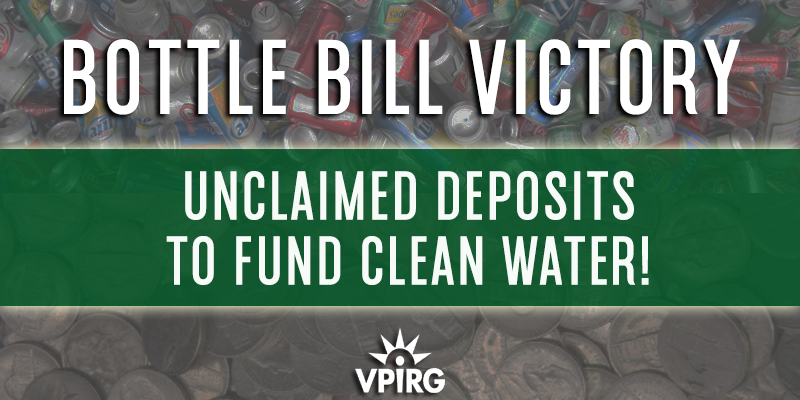For more than two decades, we’ve been working to end the giveaway of millions of dollars in unclaimed bottle deposits to the beverage industry and put that money to work for Vermonters.
Last night, the governor signed S.285, which finally reclaims the deposits and uses the money to help clean up Vermont’s water ways.
This is a victory many years in the making – the result of hard work and grassroots advocacy by countless VPIRG staffers, members, supporters and allies. Thank you for your support over the years!
Vermont’s Bottle Bill program has long been hailed as the state’s most successful and popular recycling system. Passed in 1972, the law puts a five cent deposit on carbonated beer and soda containers, and a fifteen cent deposit on liquor bottles.
At least 75 percent of the containers covered by the law are returned for redemption and recycling by consumers. But since the law was passed, Vermont has given away the unclaimed deposits – now estimated to be worth well over $2 million per year – to beverage manufacturers and distributors.
The passage of S.285 changes that equation. Instead of giving away unclaimed deposits to beverage manufacturers like Coca-Cola, beginning in October 2019 the state will recapture them and use the money to fund clean water programs.
Vermont is one of just three states that still gives its abandoned deposits to the beverage industry.
“This is a win for recycling, for clean water, and for Vermont taxpayers too,” said Paul Burns, VPIRG’s executive director.
Markets for materials collected through single stream recycling programs are collapsing worldwide right now, with much of the material too contaminated to have any value at all. The Bottle Bill generates clean glass, aluminum and plastic that can be recycled into new products — reducing pollution through their recycling and yielding raw materials with actual financial value. For instance, according to the Can Manufacturing Institute, producing aluminum from recycled material saves 92 percent of the energy required to make new aluminum.
We don’t expect the beverage industry to take this lying down — we know we’ll have to play defense next legislative session to hold the line on this important progress. We’ll also continue to fight to broaden the scope of the Bottle Bill to include wine bottles as well as a number of containers that didn’t exist when the law was passed more than 45 years ago, such as water bottles and sports drink containers.

